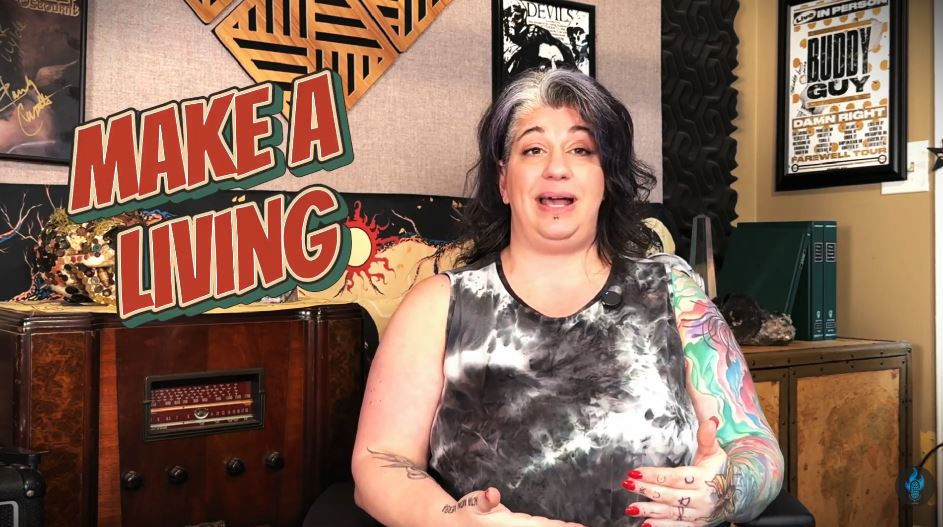Do you want to double or possibly triple your VO income? Yeah you do.
- Gabrielle Nistico VOCoach

- Jul 18, 2023
- 3 min read
Understanding that there is a difference between a session fee and a usage fee and how to charge for it could double or triple your voiceover income. But how does it work?
Do you want to double or possibly triple your VO income? Yeah you do. - 8:06
Hello, my voiceover lovelies! In this edition of The Gift of Gab, let's dive into the intriguing world of voiceover rates. Rates can be a complex and often misunderstood aspect of the industry. Today, we'll shed light on the differences between session rates, usage rates, and the infamous in perpetuity licensing. So, grab a cup of coffee, sit back, and let's demystify these concepts.
Most voiceover jobs operate on what is known as a session rate. When it comes to union jobs, agent bookings, and large-scale sessions, we are paid a session rate just for walking in the door. This rate is essentially compensation for showing up and being prepared to work, regardless of the outcome. Even if a job gets canceled at the last possible second, we still receive the session rate. Session rates used to be a constant across the board, but they have declined significantly over the past few decades.
The decline in session rates can be attributed to the rise of home studios. As voice actors began spending more time working from the comfort of their own studios, clients realized they no longer needed to pay session rates. Consequently, session rates have decreased as clients aimed to cut costs. The convenience of home studios came at the expense of these once standard rates.
On the other hand, we have usage rates, which refer to the amount of money we are paid for the actual use of the recorded material. Usage rates come into play when the material we record during a session is used for various purposes, such as commercials, web content, television, movies, or video games. A mutually agreed-upon term is determined for how long the company will use the material. The longer the term, the higher the payment for usage.
Usage rates also consider the exposure the content will receive during the agreed term. The number of people who will see or be exposed to the content influences the usage rate. This is where things start to get a bit complicated, as there is some math involved in determining the appropriate usage rate.
Now, let's address Isabella's question about why big companies pay annual rights while voiceovers for small companies on platforms like Fiverr have perpetual rights. The term Isabella is referring to is "in perpetuity," which is a phrase you should try to avoid agreeing to at all costs.
In perpetuity means forever, and when you agree to an in perpetuity rate, you essentially surrender the usage rights of your material to the client for a one-time fee. This arrangement is disadvantageous because it eliminates the possibility of a renewing term. The client can continue using the material indefinitely without paying any additional fees.
In contrast, when a term expires for non-perpetual contracts, such as those with shorter durations like weeks, months, or a year, the client must pay again to continue using the material. This system allows voice actors to earn residuals, which are additional payments for the continued use of their work. Residuals provide a steady stream of income without requiring additional effort.
Navigating the intricacies of rates, contracts, and licensing can be overwhelming. That's where talent agents, casting directors, and managers play a crucial role. They assist voice actors in negotiating contracts, tracking licenses, and ensuring that contracts are legally upheld. Their expertise saves us from the hassle of chasing down our earnings every time a usage license expires. With their support, we can focus on our craft while enjoying the occasional pleasant surprise of a generous check arriving in the mail
Understanding voiceover rates is essential for every voice actor. Session rates compensate for our professional presence, while usage rates reflect the value and exposure of the licensed material. In perpetuity licensing should be approached with caution, as it relinquishes future earning potential. Remember, residuals are the sweet reward for our hard work.
If you want to delve deeper into the world of rates, check out the resources available in this video. Don't hesitate to reach out with any questions you may have. Feel free to send a message through YouTube, the channel's email, or on social media. If you need personalized assistance, booking a class with a professional coach can be a valuable investment.
Thank you for joining us today, and remember, understanding rates is a vital aspect of mastering the business side of voiceover. Take care and keep rocking those voiceover gigs!.
704-674-8294 / GabrielleNistico.com / gabby@voiceovervixen.com
Gabrielle Nistico, Gabby Nistico, The Voiceover Vixen, The Business First VO Coach, #VoiceoverVixen #VoiceOnFire #BusinessFirstVOCoach Voiceover, Charlotte, North Carolina, Voiceover Demo, Voiceover Coaching Advice, Working Actors, Los Angeles, New York, audio, coaching









代发外链 提权重点击找我;
google留痕 google留痕;
Fortune Tiger Fortune Tiger;
Fortune Tiger Fortune Tiger;
Fortune Tiger Slots Fortune…
站群/ 站群;
万事达U卡办理 万事达U卡办理;
VISA银联U卡办理 VISA银联U卡办理;
U卡办理 U卡办理;
万事达U卡办理 万事达U卡办理;
VISA银联U卡办理 VISA银联U卡办理;
U卡办理 U卡办理;
온라인 슬롯 온라인 슬롯;
온라인카지노 온라인카지노;
바카라사이트 바카라사이트;
EPS Machine EPS Machine;
EPS Machine EPS Machine;
EPS Machine EPS Machine;
무료카지노 무료카지노;
무료카지노 무료카지노;
google 优化 seo技术+jingcheng-seo.com+秒收录;
Fortune Tiger Fortune Tiger;
Fortune Tiger Fortune Tiger;
Fortune Tiger Slots Fortune…
站群/ 站群
gamesimes gamesimes;
03topgame 03topgame
EPS Machine EPS Cutting…
EPS Machine EPS and…
EPP Machine EPP Shape…
Fortune Tiger Fortune Tiger;
EPS Machine EPS and…
betwin betwin;
777 777;
slots slots;
Fortune Tiger Fortune Tiger;
google seo…
03topgame 03topgame
gamesimes gamesimes;
Fortune Tiger…
Fortune Tiger…
Fortune Tiger…
EPS машины…
Fortune Tiger…
EPS Machine…
EPS Machine…
EPP Machine…
EPS Machine…
EPTU Machine…
EPS Machine…
seo seo